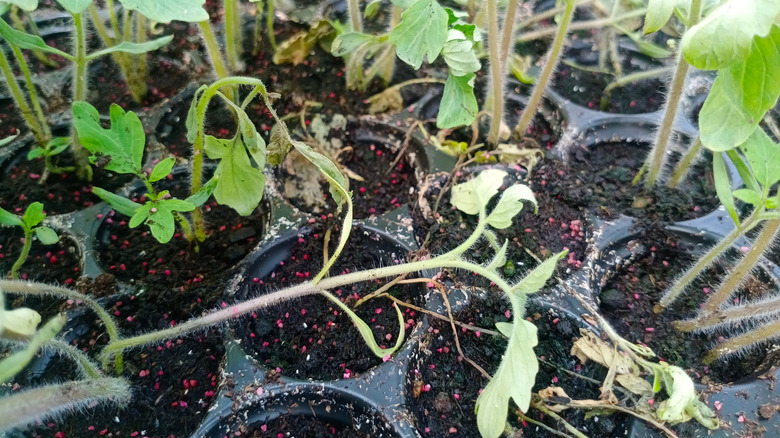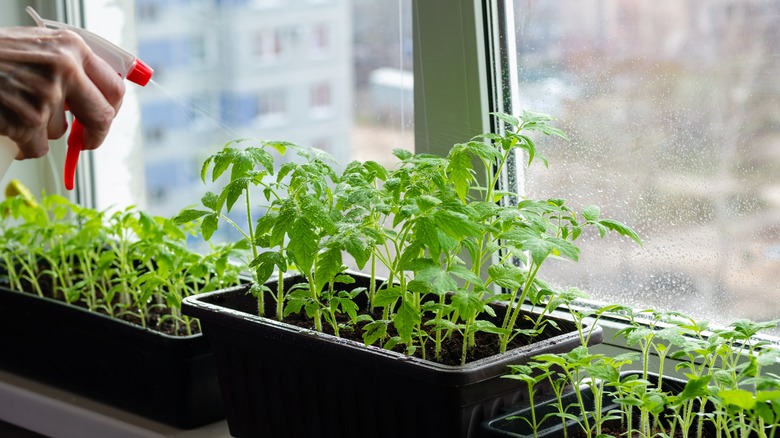Why Your Seedlings Are Falling Over (And What To Do About It)
If you're new to gardening, or even if you've been gardening for a while, you'll agree that one of the most frustrating things is coming to find that your newly sprouted seedlings are falling over. Unfortunately, this isn't just a case of your plants being overdramatic because they want you to notice and water them. When it happens with seedlings it's actually a common problem called "damping off" caused by a bacteria-related disease that leads to the delicate seedling collapsing. You may even notice the white fungal growth. Sadly, when this happens the seedlings die too quickly for anything to be done about it. The best thing you can do is learn from mistakes and practice prevention methods when planting seeds in the future.
This problem is most evident for gardeners starting seeds indoors or in a set-up where there is poor ventilation and airflow, like under glass, and especially if the seeds are overcrowded. This is because the humid environment encourages the growth of mold which leads to the decay and "damping off" of the seedlings. The low light and temperature levels during spring can also lead to seedlings growing too slowly and being more susceptible to damping. When it comes to protection and prevention the issue it's all about creating an environment where bacteria is less likely to grow and flourish. Keep reading for some common sense tips and natural remedies.
How to prevent 'damping off' in seedlings
You can minimize the growth of bacteria by always taking time to sterilize plant pots and containers to remove potential bacteria that could grow in a humid environment and kill your seedlings as they emerge. When planting seeds indoors always go for a high-quality, sterile potting mix rather than using soil from your garden that will be teeming with natural organisms that could harm your seedlings. You should also ensure that air is able to circulate and flow around your seedlings by avoiding overcrowding the seeds during planting, and opt for plastic covers with ventilation holes rather than glass enclosures. Proper water drainage is also important so that your seeds aren't sitting in soggy soil, so choose containers with a good amount of drainage holes.
The Prairie Plantgirl on YouTube shares some handy DIY natural hacks to reduce the risk of fungus growing in your soil. She suggests using a weak solution of chamomile tea by steeping 2 tea bags in 4 cups of water and letting the liquid cool down before adding it to a spray bottle and lightly spritzing your seed trays 2-3 times a week. She advises making up a new batch of the tea solution once a week to ensure that you don't introduce any new pathogens to the plants. She also suggests sprinkling some cinnamon on top of the surface or mixing it into the potting soil before planting your seeds.
How to prevent fungal growth in soil
Chamomile essential oil is known for its natural anti-fungal, antioxidant, and antimicrobial properties, and it may inhibit the growth of some bacteria. Essential oils are extremely concentrated though, so creating a solution in tea form will be a gentle way to access the benefits of this natural ingredient for your plants.
Many gardeners turn to cinnamon as an environmentally-friendly natural pesticide. It is also commonly used as a catalyst to promote root growth, which is an added benefit for your seedlings. If you catch the fungal infection early enough you could try making up a solution of water and ground cinnamon to spray onto your seedlings before they perish, as this is known to be an effective way to treat the symptoms of fungal infections in more established plants. Sprinkling the cinnamon directly into the soil to begin with as a prevention tactic is definitely the best way to go though.
As well as ensuring that your tools and materials are sterile when planting your seeds, clean hands are a must when handling seeds and soil in order to avoid contamination. Did you know that our hands carry around 150 species of germs, totaling an average of around 3,200 germs? Germs from our hands are one of the most common reasons people get sick, so protecting your seedlings from these germs by washing your hands is a no-brainer.

